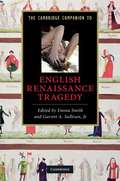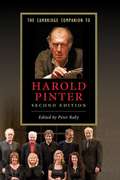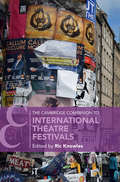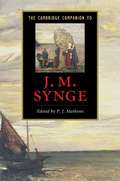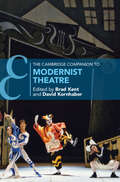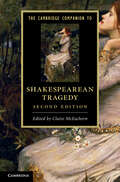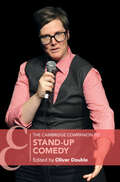- Table View
- List View
The Cambridge Companion to English Renaissance Tragedy
by Emma Smith Garrett A. Sullivan JrFeaturing essays by major international scholars, this Companion combines analysis of themes crucial to Renaissance tragedy with the interpretation of canonical and frequently taught texts. Part I introduces key topics, such as religion, revenge, and the family, and discusses modern performance traditions on stage and screen. Bridging this section with Part II is a chapter which engages with Shakespeare. It tackles Shakespeare's generic distinctiveness and how our familiarity with Shakespearean tragedy affects our appreciation of the tragedies of his contemporaries. Individual essays in Part II introduce and contribute to important critical conversations about specific tragedies. Topics include The Revenger's Tragedy and the theatrics of original sin, Arden of Faversham and the preternatural, and The Duchess of Malfi and the erotics of literary form. Providing fresh readings of key texts, the Companion is an essential guide for all students of Renaissance tragedy.
The Cambridge Companion to English Restoration Theatre
by Deborah Payne FiskThis rich and varied portrait of drama from 1660 to 1714 provides students with essential information about playwrights, staging and genres in their social and political context. The theater that followed the Restoration of Charles II is revealed in all of its tumult, energy and conflict. Contributors pay attention to major and minor playwrights, the first professional female dramatists, the performance aspects of the drama and the main dramatic genres and themes.
The Cambridge Companion to Eugene O'Neill
by Michael ManheimThis volume of specially commissioned essays contains studies of O'Neill's life, his intellectual and creative forebears, and his relation to the theatrical world of his creative period, 1916-1942. Also included are descriptions of the O'Neill canon and its production history on stage and screen, and a series of essays on "special topics" related to the playwright. One of the essays speaks for those who are critical of O'Neill's work, and the volume concludes with an essay on O'Neill criticism containing a select bibliography of full-length studies of the playwright's work.
The Cambridge Companion to George Bernard Shaw
by Christopher InnesThe Cambridge Companion to George Bernard Shaw is an indispensable guide to one of the most influential and important dramatists of the theatre. The volume offers a broad-ranging study of Shaw with essays by a team of leading scholars. The Companion covers all aspects of Shaw's drama, focusing on both the political and theatrical context, while the extensive illustrations showcase productions from the Shaw Festival in Canada. In addition to situating Shaw's work in its own time, the Companion demonstrates its continuing relevance, and applies some of the newest critical approaches. Topics include Shaw and the publishing trade, Shaw and feminism, and Shaw and the Empire, as well as analyses of the early plays, discussion plays and history plays.
The Cambridge Companion to Greek Comedy
by Martin RevermannGreek comedy flourished in the fifth and fourth centuries BC, both in and beyond Athens. Aristophanes and Menander are the best-known writers whose work is in part extant, but many other dramatists are known from surviving fragments of their plays. This sophisticated but accessible introduction explores the genre as a whole, integrating literary questions (such as characterisation, dramatic technique or diction) with contextual ones (for example audience response, festival context, interface with ritual or political frames). In addition, it also discusses relevant historical issues (political, socio-economic and legal) as well as the artistic and archaeological evidence. The result provides a unique panorama of this challenging area of Greek literature which will be of help to students at all levels and from a variety of disciplines but will also provide stimulus for further research.
The Cambridge Companion to Greek Tragedy
by P. E. EasterlingAs outspoken in his day as Richard Dawkins or Christopher Hitchens are today, American freethinker and author ROBERT GREEN INGERSOLL (1833-1899) was a notorious radical whose uncompromising views on religion and slavery (they were bad, in his opinion), women's suffrage (a good idea, he believed), and other contentious matters of his era made him a wildly popular orator and critic of 19th-century American culture and public life. As a speaker dedicated to expanding intellectual horizons and celebrating the value of skepticism, Ingersoll spoke frequently on such topics as atheism, freedom from the pressures of conformity, and the lives of philosophers who espoused such concepts. This collection of his most famous speeches includes the lectures: [ "The Gods" (1872) [ "Humboldt" (1869) [ "Thomas Paine" (1870) [ "Individuality" (1873) [ "Heretics and Heresies" (1874)
The Cambridge Companion to Greek and Roman Theatre
by Marianne Mcdonald J. Michael WaltonThis series of essays by prominent academics and practitioners investigates in detail the history of performance in the classical Greek and Roman world. Beginning with the earliest examples of 'dramatic' presentation in the epic cycles and reaching through to the latter days of the Roman Empire and beyond, the Companion covers many aspects of these broad presentational societies. Dramatic performances that are text-based form only one part of cultures where presentation is a major element of all social and political life. Individual chapters range across a two thousand year timescale, and include specific chapters on acting traditions, masks, properties, playing places, festivals, religion and drama, comedy and society, and commodity, concluding with the dramatic legacy of myth and the modern media. The book addresses the needs of students of drama and classics, as well as anyone with an interest in the theatre's history and practice.
The Cambridge Companion to Harold Pinter
by Peter RabyHarold Pinter was one of the world's leading and most controversial writers, and his impact and influence continues to grow. This Companion examines the wide range of Pinter's work - his writing for theatre, radio, television and screen, and also his highly successful work as a director and actor. Substantially updated and revised, this second edition covers the many developments in Pinter's career since the publication of the first edition, including his Nobel Prize for Literature win in 2005, his appearance in Samuel Beckett's play Krapp's Last Tape and recent productions of his plays. Containing essays written by both academics and leading practitioners, the volume places Pinter's writing within the critical and theatrical context of his time and considers its reception worldwide. Including three new essays, new production photographs, five updated and revised chapters and an extended chronology, the Companion provides fresh perspectives on Pinter's work.
The Cambridge Companion to Ibsen
by James McfarlaneIn the history of modern theatre, Ibsen is one of the dominating figures. The sixteen chapters of this 1994 Companion explore his life and work, providing an invaluable reference work for students. In chronological terms they range from an account of Ibsen's earliest pieces, through the years of rich experimentation, to the mature 'Ibsenist' plays that made him famous towards the end of the nineteenth century. Among the thematic topics are discussions of Ibsen's comedy, realism, lyric poetry and feminism. Substantial chapters account for Ibsen's influence on the international stage and his challenge to theatre and film directors and playwrights today. Essential reference materials include a full chronology, list of works and essays on twentieth-century criticism and further reading.
The Cambridge Companion to International Theatre Festivals (Cambridge Companions to Literature)
by Ric KnowlesThe global rise of festival culture and experience has taken over that which used to merely be events. The Cambridge Companion to International Theatre Festivals provides an up-to-date, contextualized account of the worldwide reach and impact of the 'festivalization' of culture. It introduces new methodologies for the study of the global network of theatre production using digital humanities, raises questions about how alternative origin stories might impact the study of festivals, investigates the festivalized production of space in the world's 'Festival Cities', and re-examines the social role and cultural work of twenty-first-century theatre, performance, and multi-arts festivals. With chapters on festivals in Africa, Asia, Australia, the Arab world, the francophone world, Europe, North America, and Latin America it analyses festivals as sites of intercultural negotiation and exchange.
The Cambridge Companion to J. M. Synge
by P. J. MathewsJohn Millington Synge was a leading literary figure of the Irish Revival who played a significant role in the founding of Dublin's Abbey Theatre in 1904. This Companion offers a comprehensive introduction to the whole range of Synge's work from well-known plays like Riders to the Sea, The Well of the Saints and The Playboy of the Western World, to his influential prose work The Aran Islands. The essays provide detailed and insightful analyses of individual texts, as well as perceptive reflections on his engagements with the Irish language, processes of decolonisation, gender, modernism and European culture. Critical accounts of landmark productions in Ireland and America are also included. With a guide to further reading and a chronology, this book will introduce students of drama, postcolonial studies, and Irish studies as well as theatregoers to one of the most influential and controversial dramatists of the twentieth century.
The Cambridge Companion to Medieval English Theatre
by Richard Beadle Alan J. FletcherThe drama of the English Middle Ages is perennially popular with students and theatre audiences alike, and this is an updated edition of a book which has established itself as a standard guide to the field. The Cambridge Companion to Medieval English Theatre, second edition, continues to provide an authoritative introduction and an up-to-date, illustrated guide to the mystery cycles, morality drama and saints' plays which flourished from the late fourteenth to the mid-sixteenth centuries. The book emphasises regional diversity in the period and engages with the literary and particularly the theatrical values of the plays. Existing chapters have been revised and updated where necessary, and there are three entirely new chapters, including one on the cultural significance of early drama. A thoroughly revised reference section includes a guide to scholarship and criticism, an enlarged classified bibliography and a chronological table.
The Cambridge Companion to Modern British Women Playwrights
by Janelle Reinelt Elaine AstonThis Companion, first published in 2000, addresses the work of women playwrights in Britain throughout the twentieth century. The chapters explore the historical and theatrical contexts in which women have written for the theatre and examine the work of individual playwrights. A chronological section on playwriting from the 1920s to the 1970s is followed by chapters which raise issues of nationality and identity. Later sections question accepted notions of the canon and include chapters on non-mainstream writing, including black and lesbian performance. Each section is introduced by the editors, who provide a narrative overview of a century of women's drama and a thorough chronology of playwriting, set in political context. The collection includes essays on the individual writers Caryl Churchill, Sarah Daniels, Pam Gems and Timberlake Wertenbaker as well as extensive documentation of contemporary playwriting in Wales, Scotland and Northern Ireland, including figures such as Liz Lochhead and Anne Devlin.
The Cambridge Companion to Modernist Theatre (Cambridge Companions to Theatre and Performance)
by Brad Kent David KornhaberThe first panoramic survey of its kind, The Cambridge Companion to Modernist Theatre is a wide-ranging guide to modernism's myriad theatrical manifestations and permutations. Covering such diverse movements as naturalism, symbolism, expressionism, surrealism, dadaism, futurism, and absurdism and ranging over many genres, including comedy, tragedy, the play of ideas, agitprop, and epic theatre, the book provides a comprehensive examination of how theatre was shaped by modernism – and in turn shaped it – as it was practised around the globe. Arranged into two halves focusing respectively on theatrical forms and major themes, the volume features chapters examining how modernist playwrights, scenographers, actors, and directors engaged with such key social, political, and cultural issues of the day as philosophy, science, religion, sexuality, gender, race, intermediality, and interculturalism. An authoritative resource for students and researchers alike, this Companion attests to the pertinence of theatre and modernism both historically and in the contemporary world.
The Cambridge Companion to Moliere
by David Bradby Andrew CalderA detailed introduction to Molière and his plays, this Companion evokes his own theatrical career, his theatres, patrons, the performers and theatre staff with whom he worked, and the various publics he and his troupes entertained with such success. It looks at his particular brands of comedy and satire. L'École des femmes, Le Tartuffe, Dom Juan, Le Misanthrope, L'Avare and Les Femmes savantes are examined from a variety of different viewpoints, and through the eyes of different ages and cultures. The comedies-ballets, a genre invented by Molière and his collaborators, are re-instated to the central position which they held in his œuvre in Molière's own lifetime; his two masterpieces in this genre, Le Bourgeois gentilhomme and Le Malade imaginaire, have chapters to themselves. Finally, the Companion looks at modern directors' theatre, exploring the central role played by productions of his work in successive 'revolutions' in the dramatic arts in France.
The Cambridge Companion to Shakespeare
by Stanley Wells Margreta De GraziaWritten by a team of leading international scholars, this Companion is designed to illuminate Shakespeare's works through discussion of the key topics of Shakespeare studies. Twenty-one essays provide lively and authoritative approaches to recent scholarship and criticism for readers keen to expand their knowledge and appreciation of Shakespeare. The book contains stimulating chapters on traditional topics such as Shakespeare's biography and the transmission of his texts. Individual readings of the plays are given in the context of genre as well as through the cultural and historical perspectives of race, sexuality and gender, and politics and religion. Essays on performance survey the latest digital media as well as stage and film. Throughout the volume, contributors discuss Shakespeare in a global as well as a national context, a dramatist with a long and constantly mutating history of reception and performance.
The Cambridge Companion to Shakespeare and Contemporary Dramatists
by Ton HoenselaarsWhile Shakespeare's popularity has continued to grow, so has the attention paid to the work of his contemporaries. The contributors to this Companion introduce the distinctive drama of these playwrights, from the court comedies of John Lyly to the works of Richard Brome in the Caroline era. With chapters on a wide range of familiar and lesser-known dramatists, including Thomas Kyd, Christopher Marlowe, Ben Jonson, John Webster, Thomas Middleton and John Ford, this book devotes particular attention to their personal and professional relationships, occupational rivalries and collaborations. Overturning the popular misconception that Shakespeare wrote in isolation, it offers a new perspective on the most impressive body of drama in the history of the English stage.
The Cambridge Companion to Shakespeare and Popular Culture
by Robert ShaughnessyThis Companion, first published in 2007, explores the remarkable variety of forms that Shakespeare's life and works have taken over the course of four centuries, ranging from the early modern theatrical marketplace to the age of mass media, and including stage and screen performance, music and the visual arts, the television serial and popular prose fiction. The book asks what happens when Shakespeare is popularized, and when the popular is Shakespeareanized; it queries the factors that determine the definitions of and boundaries between the legitimate and illegitimate, the canonical and the authorized and the subversive, the oppositional, the scandalous and the inane. Leading scholars discuss the ways in which the plays and poems of Shakespeare, as well as Shakespeare himself, have been interpreted and reinvented, adapted and parodied, transposed into other media, and act as a source of inspiration for writers, performers, artists and film-makers worldwide.
The Cambridge Companion to Shakespeare on Stage
by Stanley Wells Sarah StantonThis 2002 Companion is designed for readers interested in past and present productions of Shakespeare's plays, both in and beyond Britain. The first six chapters describe aspects of the British performing tradition in chronological sequence, from the early staging of Shakespeare's own time, through to the present day. Each relates Shakespearean developments to broader cultural concerns and adopts an individual approach and focus, on textual adaptation, acting, stages, scenery or theatre management. These are followed by three explorations of acting: tragic and comic actors and women performers of Shakespeare roles. A section on international performance includes chapters on interculturalism, on touring companies and on political theatre, with separate accounts of the performing traditions of North America, Asia and Africa. Over forty pictures illustrate peformers and productions of Shakespeare from around the world. An amalgamated list of items for further reading completes the book.
The Cambridge Companion to Shakespeare's History Plays
by Michael HattawayShakespeare's history plays have been performed more in recent years than ever before, in Britain, North America, and in Europe. This 2002 volume provides an accessible, wide-ranging and informed introduction to Shakespeare's history and Roman plays. It is attentive throughout to the plays as they have been performed over the centuries since they were written. The first part offers accounts of the genre of the history play, of Renaissance historiography, of pageants and masques, and of women's roles, as well as comparisons with history plays in Spain and the Netherlands. Chapters in the second part look at individual plays as well as other Shakespearean texts which are closely related to the histories. The Companion offers a full bibliography, genealogical tables, and a list of principal and recurrent characters. It is a comprehensive guide for students, researchers and theatre-goers alike.
The Cambridge Companion to Shakespeare's Poetry
by Patrick CheneyThis Companion provides a full introduction to the poetry of William Shakespeare through discussion of his freestanding narrative poems, the Sonnets, and his plays. Fourteen leading international scholars provide accessible and authoritative chapters on all relevant topics: from Shakespeare's seminal role in the development of English poetry, the wide-ranging practice of his poetic form, and his enigmatic place in print and manuscript culture, to his immersion in English Renaissance politics, religion, classicism, and gender dynamics. With individual chapters on Venus and Adonis, The Rape of Lucrece, The Passionate Pilgrim, 'The Phoenix and the Turtle', the Sonnets, and A Lover's Complaint, the Companion also includes chapters on the presence of poetry in the dramatic works, on the relation between poetry and performance, and on the reception and influence of the poems. The volume includes a chronology of Shakespeare's life, a note on reference works, and a reading list for each chapter.
The Cambridge Companion to Shakespearean Comedy
by Alexander LeggattThis is an accessible, wide-ranging and informed introduction to Shakespeare's comedies and romances. Rather than taking each play in isolation, the chapters trace recurring issues, suggesting both the continuity and the variety of Shakespeare's practice and the creative use he made of the conventions he inherited. The first section puts Shakespeare in the context of classical and Renaissance comedy and comic theory, the work of his Elizabethan predecessors and the traditions of popular festivity. The second section traces a number of themes through Shakespeare's early and middle comedies, dark comedies and late romances, establishing the key features of his comedy as a whole and illuminating particular plays by close analysis. Individual chapters draw on contemporary politics, rhetoric, and the history of Shakespeare production. Written by experts in the relevant fields, the chapters bring the reader up to date on current thinking and frequently challenge long-standing critical assumptions.
The Cambridge Companion to Shakespearean Tragedy
by Claire MceachernThis Companion acquaints the student reader with the forms, contexts, critical and theatrical lives of ten Shakespearean tragedies. It includes the four major tragedies and Titus Andronicus, Romeo and Juliet, Julius Caesar, Antony and Cleopatra, Coriolanus and Timon of Athens. Chapters on a demanding theatrical genre are clear, concise and informative. They consider how Shakespearean tragedy originated, developed and diversified; and how it has fared in performance.
The Cambridge Companion to Stand-Up Comedy (Cambridge Companions to Theatre and Performance)
by Oliver DoubleStand-up comedy is one of the simplest theatre forms in existence. The comedian stands on a (usually) bare stage, talking straight to the audience in the hope of getting laughs. Yet it has never been more popular, with national scenes developing across every continent except Antarctica. In this insightful and accessibly written volume, diverse chapters explore the subject from many angles, ranging from national scenes, live venues, and recordings to politics, race, sexuality, and the question of offensiveness. Chapters also consider the performance dynamics of stand-up in detail, examining audience, persona, and trauma. Interspersed throughout the chapters are a series of originally commissioned interviews with comedians from nine different countries, including Maria Bamford, Jo Brand, Aditi Mittal, and Rod Quantock, providing rare insights into their craft.
The Cambridge Companion to Theatre History
by David Wiles Christine DymkowskiScholars, amateur historians and actors have shaped theatre history in different ways at different times and in different places. This Companion offers students and general readers a series of accessible and engaging essays on the key aspects of studying and writing theatre history. The diverse international team of contributors investigates how theatre history has been constructed, showing how historical facts are tied to political and artistic agendas and explaining why history matters to us. Beginning with an introduction to the central narrative that traditionally informs our understanding of what theatre is, the book then turns to alternative points of view - from other parts of the world and from the perspective of performers in fields such as music-theatre and circus. It concludes by looking at how history is written in the 'democratic' age of the Internet and offers a new perspective on theatre history in our globalised world.
